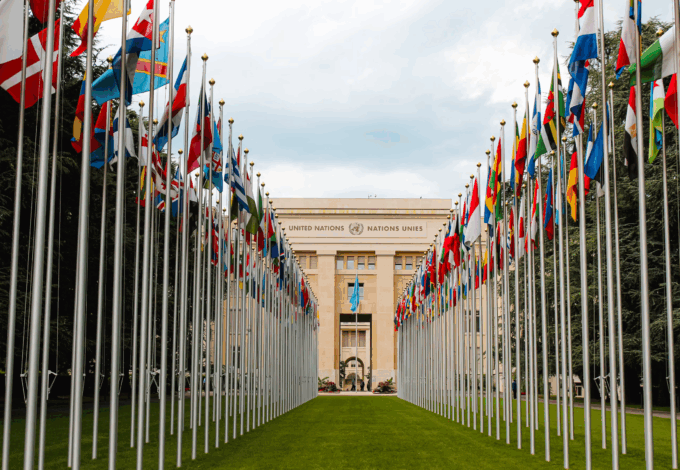
Arteries
Published on http://www.counterpunch.org/
“[T]he aims and objectives of war would immediately shift to “the arteries that make money.”
— Erik Prince to Tucker Carlson on Tucker Carlson Tonight
“When you let the market control education, profit wins and children lose. The study is consistent with the poor performance of for-profit charters Education Secretary Betsy DeVos pushed in Michigan.”
— Randi Weingarten, President, AFT, on the report of The Center for Research on Education Outcomes (CREDO), Stanford, June, 2017
The easiest way it seems to maximize profits is to maximize choice. This is so as long as the curtain is not pulled on that scam and we see that our choices are themselves restricted by the tilted game board of profit making upon which we now stand.
A serious tilt, say something like the wealthiest 10% controlling three quarters of the cumulative national wealth, may inspire the 90% to work hard to join the 10% but inspiration aside, what it realistically means is that an equitable distribution of power is itself a pipe dream. It means also that values and meanings that preserve and enhance such wealth and power dominance are force fed into the powerless. And what these conditions mean is that choices, which are packaged as “free,” are serving a will not yours, if you are not among the wealthiest 10%.
We continue to make choices that seem like our own because we position ourselves at the controls, somehow unaffected and beyond powerful choices already made and present in the world. Our position, however, in regard to choice denies us this solo command. The outside world presents constraints on what we want to do and these must be measured to determine the presence and breadth of our personal “freedom to choose.” Is there actually a space to choose or is it that we are in a space already shaped to accommodate priorities we assume and adopt as our own?
I do not believe we in the U.S. live in a culture that provides us space to observe the limitations on our choosing nor the disposition and readiness to measure such limitations if they are identified.
We are so totally into personal autonomy, the empowerment of our own will, and the unfettered freedom of our personal choices that we are not looking at the shaping forces around us.
We see no need to measure what we believe cannot affect our freedom to choose, cannot de-sanctify the sacredness of our own choices.
Unfortunately, all this sets us up as dupes, as what AI enthusiasts call “meat puppets,” humans who compare badly with the robotic AI that they envision. In that future, robots will make better choices, not because they will be free choices but better because they will more reliably serve the interests of their owners.
You perhaps foresee yourself or your progeny as owners but the realistic bet will be on that 10% wealth class and their progeny. Given the financialized nature of our economics, wealth is more likely to augment wealth than any other factor.
The owners of the machinery of AI and robotics will have the same predatory instincts as the owners of the coal mines, the steel mills, the textile plants. Choices then as now will be channeled in directions that facilitate and preserve ownership itself.
Predators and parasites of all kinds seldom choose to leave the body of their prey and are in fact relentlessly in pursuit of new prey, new frontiers of prey.
This sounds loathsome and one wonders what peculiar psychology would nurture this as a preferred economic system.
We return once again to the attractions of choice. We know that if we allow private investors into a 4 billion dollar Federal plan to improve infrastructure, this is, to investors, not an opportunity “to make infrastructure great again!” or “jobs for thousands!” but an opportunity for those who have investment money to make even more money.
President Trump’s infrastructure plans are a new marketing frontier, one that should not exist if we were not culturally inclined to see private enterprise as always preferable to government gridlock, incompetence and inefficiency.
Big Government has a bad rap sheet, as an inept and corrupt provider of services to a public whose only living is to game this inept and corrupt provider. The private sector is respected first because it is not public. It is private and thus connected to the personal, private space of individuals where personal choice and not public restraints rule.
Letting the profiteers (what capitalist seeks to minimize or modulate profits?) into the rebuilding of American infrastructure, although the Federal government can borrow from itself at a rate the privates cannot, is something we do because “we are capitalists,” and because we believe unless profit making goes everywhere, we are handing our personal freedom over to Big Government.
The Federal government’s reputation is so bad that the privates can leave the potholes, put up a toll booth every two miles, and still succeed with their anti-regulation, anti-accountability on-going campaign.
Government governs personal choices, levies taxes and never makes a profit. Private enterprise devotes itself to giving you choices, pushes to abolish taxes, and always makes a profit.
These are indelible faiths in the American mass psyche. It does not matter that regulations could be protecting you from the ravages of profit making, or is levying taxes for a public not a private good while isolating its own democratic operations from profit making. It does not matter that “profit is the only plan” is giving you a choice between levels of toxicity, or happily seeking to abolish any concern in you for “the general Welfare,” or ruthlessly intruding profit making where it clearly does not belong, in war, education, prisons, health, and now, most flagrantly, in the presidency.
We are sold the notion that you can live a healthy and a longer life if profit is being made on your health care. You can be assured that your wars are being conducted wisely, if profit is being made. You rest easy about crime and criminals if profit is being made on prisons. You can be assured your child will be well educated if profit is being made on education. You can be sure the potholes will be filled and the toll booths will be fewer if profit is made on infrastructure improvement.
There does not seem to be a great deal that has to be done to conceal profit making from enterprises whose mission is clearly not profit. Right now education and warfare make this list, not as much in the headlines as health care but just as bound into the personal choice mythos.
Both brother and sister, Erik Prince and Betsy DeVos, are digging in different profit frontiers, war in the case of the former, education, the latter, and as horrendous as both enterprises sound, we are not united in this reaction.
Brother Prince, who is advising Trump to adopt a strategy of “corporate military occupation,” states, “[o]ur problem is that we went to Afghanistan with the intention of combating terrorism, not seeking profit.” (Pulver).
Sister DeVos, newly arrived as Secretary of Education, has immediately come to the aid of predatory for-profit educational institutions that the Obama administration was putting out of business.
In eliminating “Obama-era rules governing student loan forgiveness in cases involving fraud and misconduct by universities,” DeVos claims she is defending students from predatory practices, not defending the predators:“It is the department’s aim, and this administration’s commitment, to protect students from predatory practices while also providing clear, fair and balanced rules for colleges and universities to follow.” (Pulver)
We seem to think that competition between, I suppose, the U.S. military and mercenary armies, the Marines competing with Prince’s Blackwater army, will lead to the greatest success. In war, that success would be winning the war and ending it. When the war ends, profits end so why would we assume it is in the interests of a mercenary force to end a war. “A hypothetical American South Asia Company would have no more desire to end an occupation than Toyota would have to stop selling cars or Apple to stop selling electronics.” (Pulver)
If, of course, another war was brewing, this might be a possibility, as we seem to have a number of potential wars queued up. It may be profitable for the contracted army to end a war because it is invested in making sure there will be another war. Otherwise, profit is in endless war.
Somehow, we are in personal control when war is conducted by market principles that are responsive to our personal choices.
We seem to believe on some crazy level that no profit can be made on war if we as consumers do not personally choose to fight that war. We have to see war as productive, either in protecting our own economic interests or our lives. In actuality, the only part we personally play is to fight the war; investors seldom do. So the same marketing campaign used to see the felon in every minority walking the streets or the danger in “redistributing the wealth” or “equality of outcome” is employed to sell a war.
War is here another commodity best administered according to market principles. Highly paid mercenaries, called contractors, working for Erik Prince are more efficient than governmental armies just as all private enterprise is more efficient than governmental enterprise.
War has always been a lucrative enterprise for private enterprise, as the profits of Halliburton’s KBR, Blackwater Worldwide and DynCorp International attest. There is then, as with privatized prisons incentivizing prison sentencing, an incentivizing here to carry on ceaseless warfare, which is now the case.
Public schools, which the privatizing cohorts now under Secretary of State, Betsy DeVos, call “government schools,” likewise are accused of curtailing choice by parents who don’t want their tax money going to these “government” schools.
They prefer schools that shun the name “public,” that are not run by unions and bureaucrats but by entrepreneurs who know how to succeed, who can educate children in the winning ways of entrepreneurship. The business of America is business; the business of education is business.
The pitch here is that parents want to have freedom of choice regarding what schools to send their children so why not increase choices with charter schools whether or not they are for profit and investors are making money? Is there a problem in the U.S. in making money anywhere money can be made?
Would not competition between tax funded public schools and tax funded, for-profit private schools lead us to the Holy Grail of effective teaching leading to effective learning?
Or, less predatory and more realistic, wouldn’t extracting public funds to support profit making private schools be fatal to public schools and the entire purpose of public education in a democracy? “Educate and inform the whole mass of people” as “a preservation of our liberty.” (Jefferson) There is no addendum: “And make a buck while doing it.”
The wave of choice regarding schools will build to the cresting point with Secretary DeVos and will be difficult to break by pointing out that a mission of profit is not synonymous with a mission of education in a democracy.
But as we are uncertain as to what education means any longer in the presence of a self-instructive cybertech and the obsolescence of everything from teachers, books, libraries, writing to subjects like history, modern languages, world geography, social ecology, economic theories, political ideologies and civics, any brand of success can be announced when the criteria for evaluation is eliminated.
Whether our liberty will be preserved and the “general Welfare” of “We the People” will be preserved when all students focus not on one common board, black or green, but each on a personal screen, when the Q&A and dialogue of a classroom of many students progresses to an isolated self-designed pursuit in cyberspace remains to be seen.
We can, however, already see in the political arena that a fractured personal opinionating on social media cut loose from a real world public forum, cut loose from any pre-cyberspace notion of the social, has led to a collapse in any consensus regarding truth or the facts and the evidence that lead to it.
A classroom in which students clash over what is “fake” news and whose “alternative facts” are true facts is a nightmare classroom. Perhaps isolating each student in their own computer space, relieved of having to defend their truths and facts may be our answer. It is not, however, an answer that promises much of a future for a public discourse and an ensuing functional, democratic politics.
A predictable course of events will ensue if education is fully established as a new profit stream. What is worthy to be learned will doubtlessly suit both the mission of a market rule and the priorities of technology and thus proficiency in unmarketable areas where profit is not the plan will be unproductive, then meaningless, and then vanished.
Talent and intelligence in pursuits deemed superseded by technology can run all the way to the supersession of the human. It will be difficult to imagine what will not be superseded by AI and robots when all that nurtured such imagination, though outside a “profit is a plan” mentality, has vanished.
Warfare and education, however, as profit making frontiers have not been around the track as many times as health care.
In fact, both are newly impinging on the consciousness of Hillary’s “Everyday American,” an unfortunate, for her, appellation that revealed only her distance from such an existential condition. Obama backed down from taking on health care as a profit making enterprise, not even testing the waters with the simple solution of extending Medicare services for all, and finally giving up the “public option” and leaving the field to profit making health insurers. None of this was assessed by the Obama administration as politically feasible, although right now some 60% of Americans believe health insurance for all is a government responsibility.
What the Republican Congress, however, is trying to package is a return to a pre-Obama market rule health system, a return to “choose and pay for what you need in an open market.” An outstanding reason this return has not happened as of this date is because the profit making now seems, as President Trump said of the House bill, “mean.” And it only appears mean because those who never had health insurance before Obamacare now have it and both House and Senate proposals would return them to not having it.
We never much cared or knew how many millions didn’t have coverage. They could go to Emergency. But Obamacare gave them visibility so now it’s difficult, image wise, to vanish them. Republicans will get their market rule health care wish fulfilled when the headlines messaging us as to who is getting thrown off or who will lose their Medicaid and who will die and so on dies down. When that happens, millions will once again plunge into Emergency Room health care and return to invisibility.
If lobbying leverage derives from wealth and its influence, we can expect those who cannot afford health insurance will not have any lobbying power. It will not matter if every one of them feels he or she is “free to choose.”
You want to have freedom of choice regarding doctors, hospitals, pharmaceuticals and health insurance so it doesn’t matter that “as a result, patients of limited financial means will be at the mercy of unshackled insurance companies,” or that Big Pharma’s profits, 1.05 trillion, were in 2016 equal to one-quarter of all Federal government expenses in 2016. Thom Hartmann wrote a piece on Alternet titled “11 Major Drug Companies Raked in $85 Billion Last Year, and Left Many to Die Who Couldn’t Buy Their Pricey Drugs.”
What is the bedrock issue, the foundational stone upon which a privatizing of health care, prisons, warfare and education rest?
We could say, once again, that it is the way capitalism works. But our “Everyday American” uses the expression “free enterprise” or “free markets” in which you are allowed to spend your money where you want, “private ownership” as opposed to some form of governmental takeover.
The idea that the competitiveness that fuels an ideal functioning of capitalism is in reality always threatened by a dominating, monopolizing urge, resident at the heart of competitiveness itself, is not an “Everyday American” formulation.
The idea that there is in fact an inverse relationship between free markets and free choice, the former clearly having led to societal conditions that corral choice rather than allowing it to roam as our American frontier spirit would wish, is also not an “Everyday American” formulation.
Nevertheless, these are formulations we need to choose to adopt, strengthening not the arteries that make profit but those that challenge such a destructive path.














